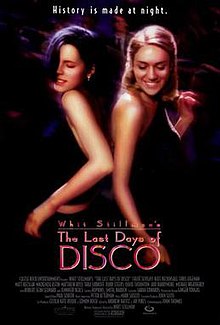The Last Days of Disco, the last and feeblest panel in Whit Stillman’s triptych, which loosely connects the first (and best) Metropolitan, in 1990, and the second Barcelona, in 1994.
| The Last Days of Disco | |
|---|---|

Theatrical release poster
|
|
Grade: C+ (** 1/2* out of *****)
Its young characters use the disco as they would use any other salon–for Stillman, discos were “civilized environments.”
But this is one of the picture’s problems: The ambience is wrong, failing to convey the passion, the erotic heat, the decadence that have characterized discos as sort of modern temples.
At the end of the film, when the characters suddenly realize disco is dead, the viewers get the feeling that they never understood what disco was about, what it meant for their lives, in the first place.
Chris Eigeman, Stillman’s favorite actor, who moves from picture to picture, articulates the director’s voice. Nick, Eigeman’s character in Metropolitan, becomes Fred in Barcelona, and then Des in Last Days of Disco. Representing the darker side of the more naive and idealistic characters, in each film he is both noxious and knowing, arrogant yet self-critical.
Ensemble driven as they are, each Stillman film has an emotional center. The Eigeman character disappeared from Metropolitan too soon, and in Barcelona his character was in coma for a whole act. As if to correct these mistakes, in Last Days of Disco, Stillman didn’t want to put Eigeman’s Des out of action, and he also created a female Eigeman character in Charlotte (Kate Beckinsale).
Charlotte and Des are strong characters, present in the story from beginning to end. Only in the last reel does the tale switch to the two “nice” ingenues, Josh (Matthew Keesler) and Alice (Chloe Sevigny), with the latter serving the function that Audrey was meant to serve in Metropolitan, except Audrey was more sympathetic. Initially, Stillman tried to tell Metropolitan from Audrey’s point of view, but he was more committed to Tom, so it became his film.
Each film in the trilogy is set against a backdrop of change–the decline of the UHBs in Metropolitan, the anti-Americanism of post-Franco Spain in Barcelona, and least pointedly, the end of disco in Last Days of Disco.
Stillman’s consistent theme is decline, like downward mobility–his stories are situated in a crucial historical moment when things begin to fade. This bitter-sweet poignancy, which lends strong dramatic structure to his work, comes from Stillman’s own experience of “hooking onto things and getting to like them just as they’re going out of fashion.”
Made on a considerable budget (for indies) of $8 million, the movie was a commercial flop at the box office.
Credits:
Directed, written by Whit Stillman
Produced by Edmon Roch, Cecilia Kate Rogue
Written by Whit Stillman
Music by Mark Suozzo
Cinematography John Thomas
Edited by Andrew Hafitz and Jay Pires
Production companies: Castle Rock Entertainment; Westerly Films
Distributed by Gramercy Pictures (US); Warner Bros. (International)
Release date: June 12, 1998
Running time: 113 minutes
Budget $8 million
Box office $3 million










